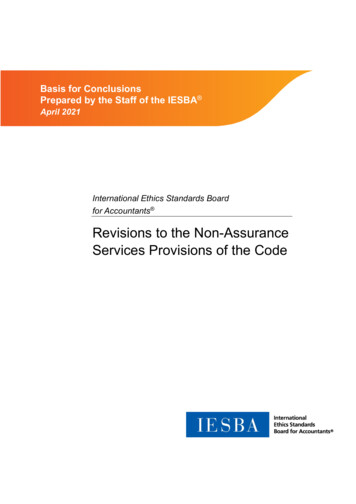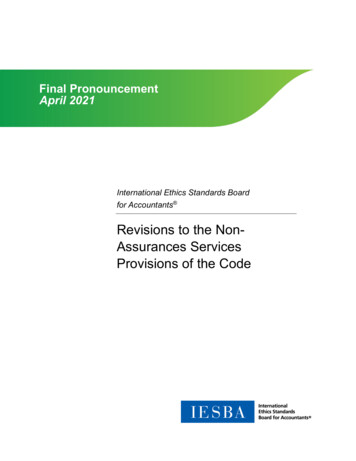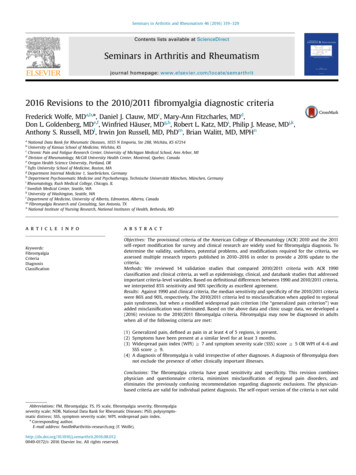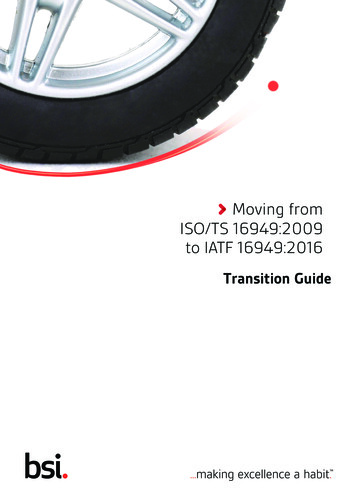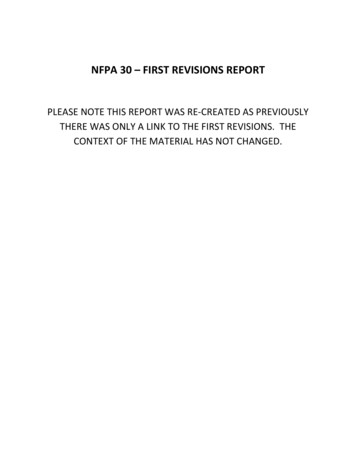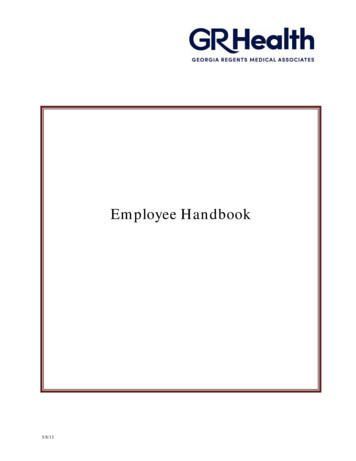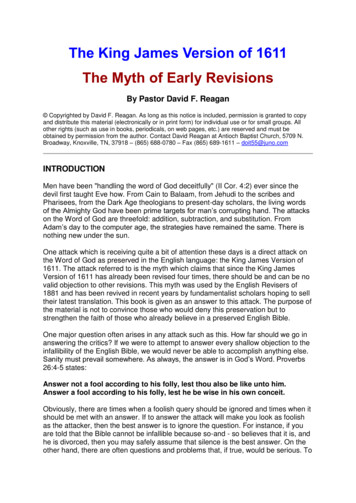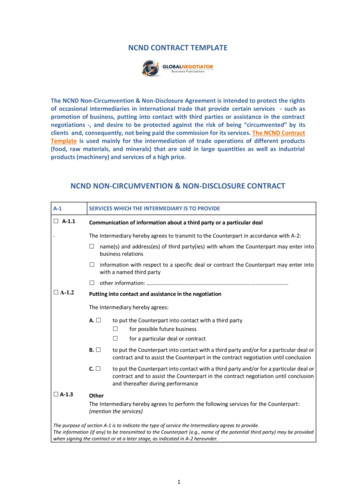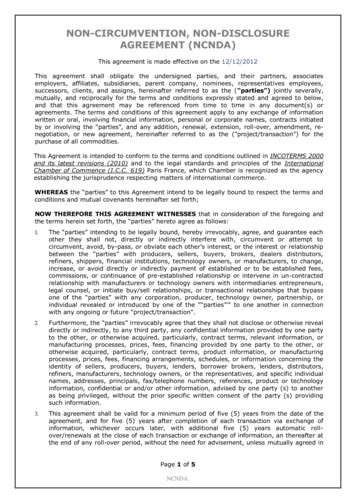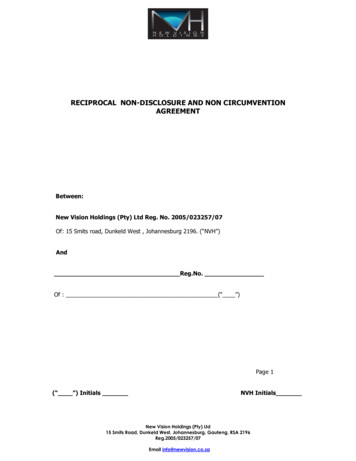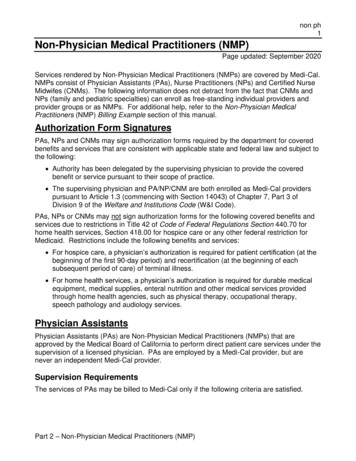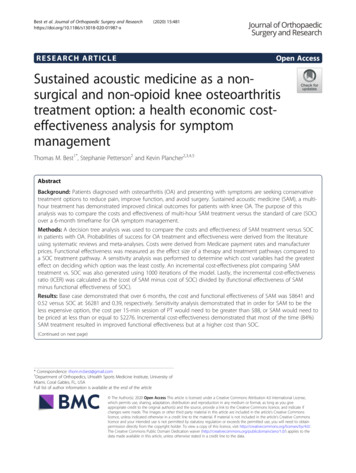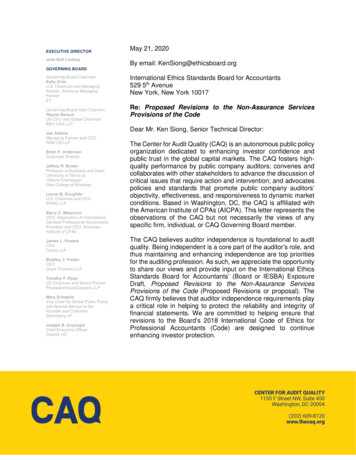
Transcription
EXECUTIVE DIRECTORJulie Bell LindsayMay 21, 2020By email: KenSiong@ethicsboard.orgGOVERNING BOARDGoverning Board ChairmanKelly GrierU.S. Chairman and ManagingPartner, Americas ManagingPartnerEYGoverning Board Vice ChairmanWayne BersonUS CEO and Global ChairmanBDO USA LLPJoe AdamsManaging Partner and CEORSM US LLPBrian P. AndersonCorporate DirectorJeffrey R. BrownProfessor of Business and DeanUniversity of Illinois atUrbana-ChampaignGies College of BusinessLynne M. DoughtieU.S. Chairman and CEOKPMG LLPBarry C. MelanconCEO, Association of InternationalCertified Professional AccountantsPresident and CEO, AmericanInstitute of CPAsJames L. PowersCEOCrowe LLPBradley J. PreberCEOGrant Thornton LLPTimothy F. RyanUS Chairman and Senior PartnerPricewaterhouseCoopers LLPMary SchapiroVice Chair for Global Public Policyand Special Advisor to theFounder and ChairmanBloomberg LPJoseph B. UcuzogluChief Executive OfficerDeloitte USInternational Ethics Standards Board for Accountants529 5th AvenueNew York, New York 10017Re: Proposed Revisions to the Non-Assurance ServicesProvisions of the CodeDear Mr. Ken Siong, Senior Technical Director:The Center for Audit Quality (CAQ) is an autonomous public policyorganization dedicated to enhancing investor confidence andpublic trust in the global capital markets. The CAQ fosters highquality performance by public company auditors; convenes andcollaborates with other stakeholders to advance the discussion ofcritical issues that require action and intervention; and advocatespolicies and standards that promote public company auditors’objectivity, effectiveness, and responsiveness to dynamic marketconditions. Based in Washington, DC, the CAQ is affiliated withthe American Institute of CPAs (AICPA). This letter represents theobservations of the CAQ but not necessarily the views of anyspecific firm, individual, or CAQ Governing Board member.The CAQ believes auditor independence is foundational to auditquality. Being independent is a core part of the auditor's role, andthus maintaining and enhancing independence are top prioritiesfor the auditing profession. As such, we appreciate the opportunityto share our views and provide input on the International EthicsStandards Board for Accountants’ (Board or IESBA) ExposureDraft, Proposed Revisions to the Non-Assurance ServicesProvisions of the Code (Proposed Revisions or proposal). TheCAQ firmly believes that auditor independence requirements playa critical role in helping to protect the reliability and integrity offinancial statements. We are committed to helping ensure thatrevisions to the Board’s 2018 International Code of Ethics forProfessional Accountants (Code) are designed to continueenhancing investor protection.
We believe a strong independence framework with appropriate safeguards can allow for nonassurance services. We agree with findings of a recent report1 that “robust independence ruleshave evolved over the past two decades to mitigate real or perceived risks of conflict of interestassociated with audit firms providing non-audit services, and these should continue to evolve inorder to keep pace with public expectations and emerging challenges.” Accounting firms todayprovide both assurance and non-assurance services to be responsive to the growing complexityand specialized nature of businesses today. The multidisciplinary model is one of the bestmechanisms to develop the skills, expertise and consistency needed for high quality audits. Whensubject to appropriate evaluations under IESBA’s existing conceptual framework, non-assuranceservices provided to audit clients do not unacceptably threaten auditor independence. For thesereasons, we commend the Board for continuously evaluating and revising these important ruleswhich safeguard auditor independence and investor protection while continuing to allow certainnon-assurance services.The following observations are for the Board’s consideration:1. Timing of the Public Interest Entity (PIE) Definition Project - We suggest the Board completethe PIE definition project before moving forward with approval and issuance of the nonassurance services standard.We agree with the Board’s view that stakeholders of PIEs have heightened expectationsregarding the audit firm’s independence and, similarly, we agree with the provision ofindependence standards specific to PIEs.The definition of PIE is integral to consideration of the Proposed Revisions in the nonassurance services standard. There is uncertainty as to whether the current project to revisitthe definition of a PIE will result in a revised definition that includes a broader array of entities.Accordingly, our comments herein are based on, and should be considered by the Boardsolely in the context of our understanding of PIEs as they would be determined under theextant Code.We recommend that the Board complete the PIE definition project before moving forward withapproval and issuance of the non-assurance services standard. This will enable stakeholdersto consider the non-assurance services proposal in the context of a potentially expanded PIEdefinition.Given the nature and extent of the new independence requirements proposed for PIEs, mostnotably, the prohibition of non-assurance services that result from the creation of a self-reviewthreat in relation to the financial statements on which the audit firm will express an opinion,we believe these are important considerations.1Audit Quality in a Multidisciplinary Firm, published September 25, 2019 by the International Federationof Accountants in partnership with Chartered Accountants Australia and New Zealand and theAssociation of Chartered Certified Accountants.Page 2 of 7
2. Identifying a Self-Review Threat – We suggest modification to the criteria for identifying a selfreview threat.We appreciate the Board’s diligence in drafting the overarching prohibition of providing nonassurance services to PIE audit clients when a self-review threat will be created, and we aresupportive of such prohibition. However, we believe there may be diversity among users ofthe Code in the interpretation and application of the three criteria for identifying the creationof a self-review threat provided in points (a), (b), and (c) of 600.11 A2 due to the use of thephrase “whether there is a risk that” in the lead-in paragraph to the three criteria. In addition,considering the “risk” that the three criteria will occur without scaling for the probability of suchoccurrence could result in an interpretation that virtually all non-assurance services providedto PIEs would be prohibited, which we do not understand to be the Board’s intention and wewould not support.As such, we recommend removing the words “there is a risk that” from the applicationguidance as noted below:600.11 A2Identifying whether the provision of a non-assurance service to an audit clientwill create a self-review threat involves determining whether there is a riskthat:a) The results of the service will affect the accounting records, internalcontrols over financial reporting, or the financial statements on which thefirm will express an opinion;b) In the course of the audit of those financial statements, the results of theservice will be subject to audit procedures; andc) When making an audit judgment, the audit team will evaluate or rely onany judgments made or activities performed by the firm or network firm inthe course of providing the service.3. Providing Advice and Recommendations – We encourage the Board to provide examples ofsituations when providing advice and recommendations are likely and not likely to create aself-review threat.As stated in extant paragraph 600.7 A4, providing advice and recommendations to assist themanagement of an audit client in discharging its responsibilities is not assuming amanagement responsibility. Proposed paragraph 600.12 A1 states that providing advice andrecommendations might create a self-review threat. The revisions proposed by IESBA areinsufficiently clear when a firm may have assumed a management responsibility whenproviding advice and recommendations. Thus, there is the potential for the ProposedRevisions to be broadly interpreted as prohibiting advice and recommendations. Specifically,it would be helpful for the Board to provide examples of situations where a self-review threatmay exist as well as situations where a self-review threat likely does not exist.Page 3 of 7
4. Communication with Those Charged With Governance Regarding Non-Assurance Services –We encourage the Board to include a materiality qualifier and limit the scope to consolidatedentities.The proposal includes a new paragraph – R600.18 – which states, “Before a firm or a networkfirm accepts an engagement to provide a non-assurance service to an audit client that is apublic interest entity which, for this purpose, shall include only related entities over whichthe audit client has direct or indirect control the firm shall provide those charged withgovernance with sufficient information to enable them to make an informed decision about theimpact of the provision of such a non-assurance service on the firm’s independence.”As this is consistent with the requirements in the US, we generally support the requirement toobtain concurrence of those charged with governance for the provision of a non-assuranceservice to the audit client. However, we recommend the Board consider a de minimis thresholdunder certain circumstances. For example, US Securities and Exchange Commission’s (SEC)Rule 2-01(c)(7)(i)(C), states,“With respect to the provision of services other than audit, review or attest services the preapproval requirement is waived if:(1) The aggregate amount of all such services provided constitutes no more than fivepercent of the total amount of revenues paid by the audit client to its accountantduring the fiscal year in which the services are provided;(2) Such services were not recognized by the issuer or registered investment companyat the time of the engagement to be non-audit services; and(3) Such services are promptly brought to the attention of the audit committee ofthe issuer or registered investment company and approved prior to the completion ofthe audit by the audit committee or by one or more members of the audit committeewho are members of the board of directors to whom authority to grant suchapprovals has been delegated by the audit committee.”Further, we recommend the Board revise paragraph R600.18 to apply only to the publicinterest entity and those entities consolidated into the audit client’s financial statements,similar to SEC Rule 2-01(c)(7). By including the language “shall include only related entitiesover which the audit client has direct or indirect control” the proposal may extend beyondthe public interest entity’s consolidated entities. In the private equity space, this may beparticularly problematic as controlled entities are not always consolidated into the audit client’sfinancial statements.In this instance, we encourage an approach similar to the SEC’s independence rules. Webelieve avoiding unnecessary differences among rules and standards that are well understoodpromotes investor protection.Page 4 of 7
5. Accounting and Bookkeeping – We encourage the Board to clarify that responding toquestions related to technical accounting matters during an audit usually does not create aself-review threat.Similar to the extant Code, proposed Subsection 601, Accounting and Bookkeeping Services,describes management’s responsibility for the preparation and fair presentation of thefinancial statements in accordance with the applicable financial reporting framework. Weagree with proposed paragraph 601.2 A2 which acknowledges that the audit processnecessitates dialogue between the firm and management of the audit client and that suchactivities do not usually create threats as long as the client accepts responsibility for makingthe decisions involved in the preparation of accounting records or financial statements andthe firm does not assume a management responsibility.The Board’s extant paragraph 601.3 A4 specifies that technical assistance or advice oncertain matters provided by the auditor “do not usually create threats provided neither the firmnor network firm assumes a management responsibility for the client.” We encourage theBoard to retain this provision.We do not support including the 5th bullet related to providing technical advice in proposedparagraph 601.2 A3, which cites examples of accounting and bookkeeping services asfollows:601.2 A3 Accounting and bookkeeping services comprise a broad range of servicesincluding: Preparing accounting records or financial statements.Recording transactions.Payroll services.Providing technical assistance on matters such as resolving accountreconciliation problems.Providing technical advice on accounting issues, including the conversion ofexisting financial statements from one financial reporting framework to another.We encourage the Board to remove the bullet “providing technical advice on accountingissues ” We are concerned that a dialogue between the firm and the management of theaudit client related to technical accounting matters as part of the audit process could beinterpreted as providing technical advice and creating a self-review threat. Removing thebullet from 601.2 A3 would clarify that responding to questions and engaging in technicaldiscussions in the normal course of the audit does not usually create a self-review threat.6. Tax Services – We support the “likely to prevail” condition included in proposed paragraphsR604.4 (tax services) and 604.12 A2(c) (tax providing advisory and tax planning services).We note that both extant paragraph 604.7 A3 and proposed paragraph 604.12 A2(c) statethat providing tax advisory and tax planning services will not create a self-review threat if suchservices “have a basis in tax law that is likely to prevail.” It is noted that the Board extensivelyPage 5 of 7 pa
to consider the non-assurance services proposal in the context of a potentially expanded PIE definition. Given the nature and extent of the new independence requirements proposed for PIEs, most notably, the prohibition of non-assurance services that result from the creation of a self-review threat in relation to the financial statements on which the audit firm will express an opinion, we .
